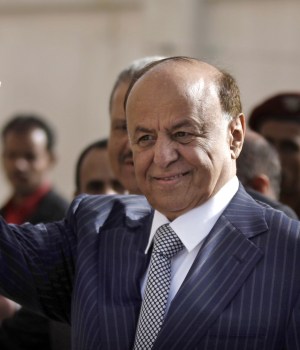
President Abed Rabbo Mansour Hadi set foot in Yemen on Tuesday for the first time since Shiite rebels drove him into exile in Saudi Arabia about six months ago, a government official said.
In his boldest attempt yet to reassert authority over war-torn Yemen, Hadi arrived with three other ministers in the key southern port city of Aden, said Alawi Bafaqeeh, the immigration minister in his government.
A Saudi-led coalition captured Aden from the rebels, known as Houthis, in July as part of a large-scale military operation to help Hadi regain control over the country.
“President Hadi arrived in Aden today at approximately 5:30 p.m.,” said Bafaqeeh, speaking by telephone from Aden. “He has come back to perform his duties as president, because there is security in Aden now.”
Fierce clashes erupted in Taiz, Yemen between Iran-backed Houthi militiamen and troops loyal to exiled President Abd-Rabbu Mansour Hadi as both sides try to claim control of Yemen’s third largest city, residents and witnesses said. (Reuters)
The embattled Hadi’s return reflects how the momentum of a conflict that accelerated in March with Saudi-led airstrikes has shifted away from the Houthis. The rebels have been driven out of much of southern Yemen by troops from Saudi Arabia, the United Arab Emirates and pro-Hadi units in Yemen’s splintered military.
Over the past year, the Houthis had taken control of vast territory in Yemen, including the capital, Sanaa. The rebels, who still control the capital, toppled Hadi’s government in February, triggering the Saudi-led airstrikes a month later.
Saudi Arabia views the Houthis as proxies of regional enemy Iran, but the rebels dispute this.
The director of Hadi’s office, Mohammed Marem, said the president came to Aden to announce reconstruction projects and prepare plans to “liberate” areas of the country that remain under Houthi control, including “Sanaa and beyond.” Marem declined to specify how long Hadi would stay in Aden, where he does not have strong popular support.
Hadi came to power in 2012 after an Arab Spring uprising toppled his predecessor, Ali Abdullah Saleh.
Several members of Hadi’s cabinet have returned in recent days from Saudi Arabia and are working out of Aden, which has been troubled by lawlessness since the Houthis were driven out.
Last month, a bomb exploded in the office of Aden province’s governor, killing at least four people, although the governor was unharmed. Residents also say that fighters linked to al-Qaeda in the Arabian Peninsula, the powerful al-Qaeda affiliate in the country, have been roaming Aden’s streets.
The fighting in Yemen has killed more than 4,500 people and caused what the United Nations and aid workers describe as a humanitarian disaster in the Arabian Peninsula country of 25 million people.
In recent weeks, Saudi, UAE and Yemeni fighters aligned with Hadi have been battling the Houthi rebels for control over the oil-rich Marib province, which is within striking distance of Sanaa. The coalition has captured most of Marib, about 75 miles east of the Yemeni capital, but Houthi fighters and their allied units in Yemen’s military have put up stiff resistance.
The battles in Marib and other areas close to Sanaa appear to have slowed the coalition’s momentum, complicating apparent Saudi ambitions in Yemen.
The coalition’s troop buildup in Marib reportedly accelerated after a Houthi missile strike in the province this month killed 60 soldiers from Saudi Arabia, the UAE and Bahrain. It was the deadliest incident for the coalition, triggering apparent retaliatory airstrikes in the capital. The air raids killed scores of civilians, residents said.









































